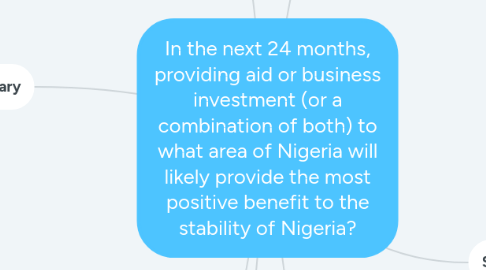
1. Geographical
1.1. Located in Western Africa
1.1.1. Borders Gulf of Guiena
1.1.2. Between Cameroon and Benin
1.2. Climate
1.2.1. Tropical in center
1.2.2. Equatorial in south
1.2.3. Arid in north
1.3. Terrain
1.3.1. Central hills
1.3.2. Plateaus
1.3.3. Plains
1.4. Natural resources
1.4.1. Natural gas
1.4.2. Petroleum
1.4.3. Tin
1.4.4. Iron ore
1.5. Transportation
1.5.1. Railroads
1.5.1.1. Poorly maintained
1.5.1.2. Perilous condition
1.5.1.3. Privatizing the Nigerian Railway Corporation
1.5.2. Highways
1.5.2.1. Largest road network in West Africa
1.5.2.2. 108,000 km of surfaced road
1.5.2.3. Poorly maintained
1.5.2.3.1. Cited as a reason for high rate of road fatalities
1.5.3. Waterways
1.5.3.1. 8,600 km of inland waterways
1.5.3.2. Used for commerce and powered boats
1.5.4. Airports
1.5.4.1. Fifty-four total airports
1.5.4.1.1. Poor reputation for operational efficiency and safety
1.5.4.1.2. Five international airports
2. Military
2.1. Crime
2.1.1. Organized Crime
2.1.2. Drug Trafficking
2.1.2.1. Heroine
2.1.2.2. Cocaine
2.2. Military branches
2.2.1. Armed Forces
2.2.2. Army
2.2.3. Navy
2.2.4. Air Force
2.3. 18 years of age for voluntary military service
2.4. Nigerian Police Force
2.4.1. 371,800 members
2.4.2. Department of Finance and Administration
2.4.3. Department of Operations
2.4.4. Department of Logistics and Supply
2.4.5. Department of Criminal Investigation
2.4.6. Department of Training and Development
2.4.7. Department of Research and Planning
2.4.8. Department of Information Technology
2.4.9. Police Mobile Force
2.4.9.1. Dedicated to anti-riots
2.5. High risk of armed robbery of ships and piracy
2.6. Terrorism
2.6.1. Boko Haram
2.6.2. Ansaru
2.6.3. ISIL
3. Technology
3.1. Communication
3.1.1. Internet
3.1.1.1. 47,759,904 users
3.1.1.2. Country code .ng
3.1.2. Telephones
3.1.2.1. Fixed lines
3.1.2.1.1. 154,513 subscribers
3.1.2.2. Cellular lines
3.1.2.2.1. 154,342,168 subscribers
3.2. Media
3.2.1. 70 government-controlled TV stations
3.2.2. Several private TV stations
3.2.3. 40 governments-owned radio stations
3.2.4. 20 private radio stations
3.3. Science
3.3.1. Nigerian Academy of Science
3.3.1.1. Official academy of science of Nigeria
3.3.1.2. Governed by a council
3.3.1.3. Core members are called "Fellows"
4. Energy
4.1. Electricity
4.1.1. 95,000,000 without it
4.1.1.1. Poverty-stricken or too expensive?
4.2. Environment issues
4.2.1. Flooding
4.2.2. Solid degration
4.2.3. Rapid deforestation
4.2.4. Water pollution
4.2.5. Oil pollution
4.2.6. Rapid urbanization
4.3. Crude Oil
4.3.1. Production
4.3.1.1. 1.871 million bbl/day
4.3.1.1.1. Private or government-funded production?
4.3.2. Exports
4.3.2.1. 2.279 million bbl/day
4.3.2.1.1. Where is it headed?
4.3.3. Reserves
4.3.3.1. 37.06 billion bbl
4.4. Natural Gas
4.4.1. Production
4.4.1.1. 45.15 billion cu m
4.4.1.1.1. Private or government-funded production?
4.4.2. Exports
4.4.2.1. 26.33 billion cu m
4.4.2.1.1. Where is it headed?
4.4.3. Reserves
4.4.3.1. 5.284 trillion cu m
5. Economy
5.1. GDP
5.1.1. Purchasing Power Parity-USD 1.118 trillion
5.1.1.1. Ranked 24th in comparison to the world
5.1.2. Per Capita-USD 5,900
5.1.3. Composition
5.1.3.1. Agriculture-21.8%
5.1.3.2. Industry-18.3%
5.1.3.3. Services-60.1%
5.2. Over-reliance of a single or specific resources?
5.2.1. Main Industries
5.2.1.1. Crude Oil
5.2.1.1.1. Corruption
5.2.1.2. Coal
5.2.1.3. Tin
5.2.1.4. Rubber Products
5.3. Agricultural Products
5.3.1. Cocoa
5.3.2. Peanuts
5.3.3. Cotton
5.4. Labor Force
5.4.1. 60.08 Million
5.4.2. By Occupation
5.4.2.1. Agriculture-70%
5.4.2.2. Industry-10%
5.4.2.3. Services-20%
5.5. Weak or strong economy?
5.5.1. Considered a strong nation or stumbling to get by?
6. Social
6.1. Unemployment Rate-13.4%
6.2. Population under poverty line-70%
6.3. Population-190,632,261
6.4. Languages
6.4.1. English
6.4.2. Hausa
6.4.3. Yoruba
6.5. Religion
6.5.1. Muslim-50%
6.5.2. Christian-40%
6.5.3. Indigenous beliefs-10%
6.6. Infectious diseases
6.6.1. Degree of risk: very high
6.6.2. HIV/AIDS
6.6.2.1. 160,000 deaths (2016 est.)
6.6.3. Malaria
6.6.4. Yellow Fever
6.6.4.1. Any precautions given to public?
6.6.5. Meningococcal meningitis
6.7. Literacy
6.7.1. Male-69.%
6.7.2. Female-49.7%
7. Political
7.1. Federal president republic
7.2. Independence 1 October 1960 (From United Kingdom)
7.3. Legal System
7.3.1. English common law
7.3.1.1. How does the public balance law?
7.3.1.1.1. Riots?
7.3.2. Islamic law
7.3.3. Traditional law
7.4. Executive Branch
7.4.1. Chief of state
7.4.2. Head of government
7.4.3. Elections
7.5. Supreme Court-15 members and Chief Justice
7.6. History of military coups
7.7. Lost USD 400 Billion due to corruption since Independence
7.7.1. Goodluck Jonathon scandal
